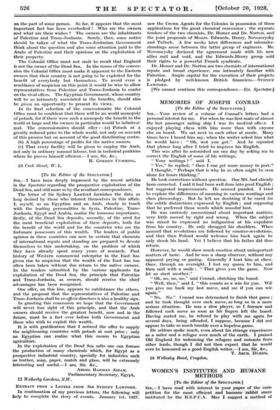MEMORIES OF JOSEPH CONRAD [To the Editor of the SPECTATOR.]
SIR,—Your review of a volume of Conrad's letters had a personal interest for me. For when he was first mate of almost the last passenger sailing ship I was its medical colleen I enjoyed playing chess with him more than with anyone else on board. We sat next to each other at meals. Many times have I heard him say, when the waiter asked him what he would have : " Oh, wot you got." And he repeated that phrase long after I tried to improve his English..
This was after he astonished me one day by asking me to correct the English of some of his writings.
" Your writings ? " said I.
" Yes," he replied, " then I can get more money in port." I thought, " Perhaps that is why he so often might be seen alone for hours thinking."
He took corrections without question. One MS. had already been corrected. I said it had been well done into good English ; but suggested improvements. He seemed puzzled. I tried to explain the differences of meaning in various wordings and class phraseology. But he left me doubting if he cared for the subtle distinctions expressed by English ; and supposing that he preferred those words which sounded best.
He was curiously unemotional about important matters, very little moved by right and wrong. When the subject was raised he expressed no indignation at his expulsion from his country. He only shrugged his shoulders. When assured that revolutions are followed by counter-revolutions, and that then Poland would welcome him back again he only shook his head. Yet I believe that his father did thus return.
However, he would show much emotion about unimportant matters of taste. And he was a sharp observer, without any apparent prying or gazing. Generally I beat him at chess. Once, through an oversight, I lost my queen to him, and then said with a smile : " That gives you the game. Now let us start another."
" Oh, no, no, no," said Conrad, clutching the board.
" Well, then," said I, " this counts as a win for you. Wili you give me back my last move, and see if you can win again."
" No. No." Conrad was determined to finish that game ; and he took thought over each move, as long as in a more serious situation. He was a slow player, so I foresaw and followed each move as soon as his fingers left the board. Having mated me, he refused to play with me again for several days, being offended, I suppose, because I did not appear to. take so much trouble over a hopeless game.
He seldom spoke much, even about his strange experiences as a sailor and a refugee over much of the earth. I praised Old England for welcoming the refugees and outcasts from other lands, though I did not then expect that he would ever be honoured as a good English writer.—I am, Sir, &c., T. ARCH. Mums. 16 Wellesley Road, Croydon.






























































 Previous page
Previous page